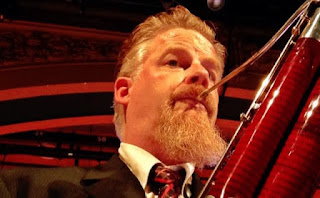Mark Ortwein's 'It Was Time' is a showcase of reedman's extraordinary range
 |
| Main axe: Mark Ortwein plays the bassoon. |
The ultimate balance of Mark Ortwein's recorded calling-card as a jazz musician is reflected in the title. On the one hand it's a tribute and a gift of closure on his late mother's life, on the other a well-considered pun on the bebop classic "Now's the Time." The music itself on "It Was Time" covers a wide range: You don't expect to get an updated version of the chestnut "After You've Gone" roasting on the same open fire as "Bigfoot," the spine-tingling final track.
Ortwein, assistant principal bassoonist of the Indianapolis Symphony Orchestra, has been known for exhibiting his jazz chops in small groups ever since his arrival here in 2002. His electrified bassoon has most conspicuously been featured for a mass audience playing the national anthem solo for the Indiana Pacers, and it is a substantial part of his performing profile outside the ISO.
On "It Was Time," he ranges across the whole saxophone family (apart from such bizarre outliers as the contrabass monster): soprano, alto, tenor and baritone, and of course some well-mixed, plugged-in bassoon. That instrument holds its own with his son Olas Ortwein's guitar on "Bigfoot," Olas' composition. That's just part of the studio wizardry on this album, starting with Frank Glover's arrangement of the title tune. Prominent as a clarinetist-composer, Glover is heard on piano here, with the bandleader picking up another reed instrument, the bass clarinet.
As a performing impresario, Ortwein plays with a wide variety of musicians. The Caribbean vibe is nailed down by keyboardist-percussionist Pavel Polanco-Safadit, multi-tracked, on "Pepperoni Grande Con Queso Mas," a tasty original by the bandleader.
Among the other guests, all up to their specific tasks, is award-winning vocalist Josh Kaufman performing one of his specialties, "I Can't Make You Love Me." Whatever and whomever he chooses on this disc, Ortwein's taste is unerring.
For instance, you can study a few different drumming styles just in his choice of men behind the kit: Carrington Clinton, a master of funk drumming, puts crucial support behind the double-tracked tenor and electrified bassoon on John Coltrane's "Lonnie's Lament." Johnny Concannon lends a vital rock style to "Bigfoot," a piece that won me over despite my aversion to rock: the groove is relentlessly heavy, but it's important to note there's nothing simple-minded about the piece's melodic line.
ISO percussion colleague Craig Hetrick has a jazz side equal in comfort and competence to the bandleader: he heats up impressively on "Basso Bossa" (by another ISO colleague, Peter Hansen, who plays bass on this track). Longtime sideman John Fell lends some fancy guitar here, and his inventiveness is essential to several other tracks as well. (Nevertheless, "Basso Bossa" is the one piece that goes on too long, it seems to me, though it's clear everyone is having loads of fun with it).
The clever contributions of trumpeter Kenny Rampton to "After You've Gone" and "Bigfoot" are delightful. Gary Walters' amiable, flexible piano style is the perfect complement to Ortwein's approach to the alto on "Lunar Love." It's typical insofar as Ortwein plunges to the heart of each of his instruments' character and places them all in revealing and copacetic settings — from players to arrangements and the mixing and mastering of Jeremy Radway.
"It Was Time" indeed to have this musician's spectacular self-portrait out in durable form.



Comments
Post a Comment